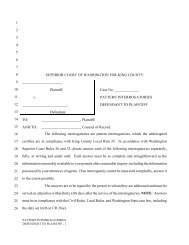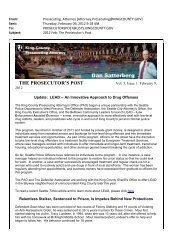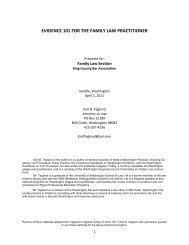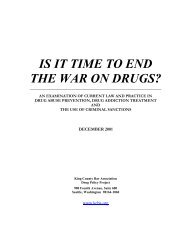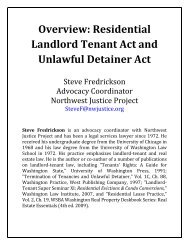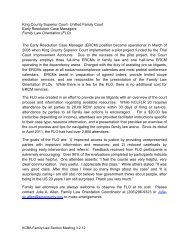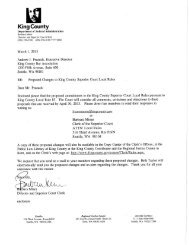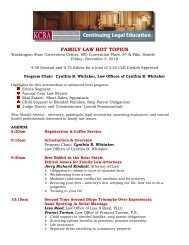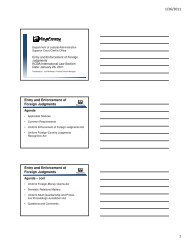Effective Drug Control: Toward A New Legal Framework
Effective Drug Control: Toward A New Legal Framework
Effective Drug Control: Toward A New Legal Framework
Create successful ePaper yourself
Turn your PDF publications into a flip-book with our unique Google optimized e-Paper software.
Impaired Administration of Justice and Civil Rights<br />
The effect of drug prohibition on crime has compromised the total administration<br />
of justice in American society, sapping resources from the civil and family courts in order<br />
to process the huge number of drug-related cases in the criminal courts. In addition, the<br />
large number of arrestees for drug law violations overloads the police, giving rise to<br />
irregular procedures to cope with the work pressures. The difficulties of enforcing laws<br />
against consensual activity such as the sale and use of prohibited drugs has led to<br />
extensive use of informants, wiretapping and “bugging” and often to entrapment, to<br />
arrests and searches prior to obtaining proper warrants and even to the offering of drugs<br />
to physiologically-dependent addicts in order to get information. 427<br />
The clogging of the courts with petty drug cases has often led to hasty bargaining<br />
to clear the dockets, resulting in penalties that bear little consistent relationship to the<br />
actual conduct in question and that are more related “to the social status of the accused<br />
and his retention of an astute lawyer.” 428 Largely due to the disproportionately adverse<br />
effect of drug law enforcement on racial minorities and the poor, many in those segments<br />
of the public have come to disrespect law enforcement and the courts and have further<br />
acquired attitudes conducive to the violation of laws and to non-cooperation with law<br />
enforcement. 429<br />
The “War on <strong>Drug</strong>s” has also had the effect of militarizing the police. Over 90%<br />
of cities with populations over 50,000, and 70% of smaller cities, have paramilitary units<br />
in their police departments, sometimes equipped with tanks, grenade launchers and<br />
helicopters. 430<br />
The federal <strong>Control</strong>led Substances Act and most of the complementary state<br />
statutes, as well, have general forfeiture provisions with respect to any property used to<br />
violate the drug laws. 431 Seizure is authorized prior to conviction upon the issuance of a<br />
warrant. 432 The police department may often keep the property seized, creating an ethical<br />
dilemma and a conflict of interest.<br />
Curbs on Legitimate Medical Practice<br />
Federal laws restricting the prescription of regulated pharmaceutical drugs have<br />
limited appropriate medical treatment, especially for patients with chronic and severe<br />
pain who rely on opioid analgesics. Patients suffering from severe pain caused by<br />
conditions such as cancer, degenerative arthritis and nerve damage have usually tried<br />
surgery and other medications like codeine before turning to stronger opiates such as<br />
hydrocodone (Vicodin), oxycodone (OxyContin), morphine or methadone. 433 With the<br />
increased diversion of these drugs, federal and state local authorities have increased their<br />
scrutiny of doctors who prescribe pain medications. Twenty-one states have prescription<br />
drug monitoring programs. 434 Unfortunately, the signs the authorities are looking for –<br />
prescribing high volumes of narcotic painkillers for extended periods, prescribing<br />
potentially lethal doses or prescribing several different drugs – could also be signs that a<br />
doctor is responsibly treating someone with intractable pain. A patient visiting several<br />
pharmacies, what could be considered “doctor shopping” by the authorities, may be an<br />
attempt to attain an adequate level of pain control. The pressure on the doctors have left



